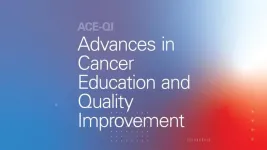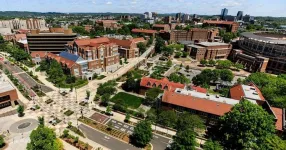(Press-News.org) UCLA Health Jonsson Comprehensive Cancer Center researchers and physicians who specialize in treating patients with radiation therapies will present data on the latest radiation oncology research and clinical trial results at the 66th annual American Society for Radiation Oncology (ASTRO) meeting in Washington D.C., Sept. 29 to Oct. 2.
The annual meeting, which is the leading meeting in radiation oncology, will feature 23 abstracts from UCLA investigators that highlight key areas of radiation oncology, including new research in subspecialties ranging from survivorship, lung cancer/thoracic malignancies, physics, sarcoma, gastrointestinal cancer, genitourinary cancer, gynecological cancer, pediatric cancer and diversity, equity and inclusion in healthcare.
"Our team is proud to present research that pushes the boundaries of what's possible in radiation oncology,” said Dr. Michael Steinberg, professor and chair of Radiation Oncology at the David Geffen School of Medicine at UCLA and director of Clinical Affairs at the UCLA Health Jonsson Comprehensive Cancer Center. “These studies, ranging from innovative approaches in chemoradiotherapy and symptom monitoring to advancements in MRI-guided radiotherapy, underscore our commitment to improving patient outcomes and shaping the future of cancer treatment."
Highlights of noteworthy presentations at ASTRO that are led by UCLA investigators include:
Abstract 1071: MicroRNA-Based Germline Biomarkers of Pathologic Complete Response to Neoadjuvant Chemoradiotherapy in Rectal Cancer
A team of researchers led by Dr. Joanne Weidhaas, professor of radiation oncology, vice chair of molecular and cellular oncology and director of translational research at the David Geffen School of Medicine at UCLA, identified a genetic signature that could help predict which patients with locally advanced rectal cancer are most likely to achieve a pathologic complete response following treatment with a combination of chemotherapy and radiotherapy. Prior to this study, there has not been a molecular based assay to predict which patients are most likely to benefit from chemoradiotherapy to help with treatment selection. The study, conducted with 90 patients with rectal cancer, focused on microRNA-related single nucleotide polymorphisms (miSNPs), which are genetic variations that can disrupt microRNA signaling, a critical process in regulating gene expression. By analyzing mirSNPs in conjunction with clinical variables, including age, tumor stage and KRAS mutation status, the researchers developed a predictive model with a strong ability to identify patients who would achieve a complete response where no viable tumor cells remain after treatment. The predictive model, built using advanced statistical techniques, outperformed models based solely on clinical factors. This model offers a more personalized approach that could identify patients most likely to respond to this treatment approach, and could potentially help them avoid unnecessary surgery. The team plans to validate these findings in a larger patient cohort and further investigate the mirSNP signature’s ability to predict treatment toxicity.
Weidhaas will present the findings during Session: QP 13-GI 4: GI Cancers: From top to bottom on Tuesday, Oct. 1 at 4pm EST in room 152.
Abstract 317: Magnetic Resonance Imaging-Guided vs Computed Tomography-Guided Stereotactic Body Radiotherapy for Prostate Cancer: 2-Year Outcomes from the MIRAGE Randomized Clinical Trial
In a secondary analysis of a randomized phase 3 clinical trial comparing two methods of guiding stereotactic body radiotherapy (SBRT) for prostate cancer, researchers found patients treated with MRI guidance had fewer long-term side effects and better quality of life related to bowel and sexual health compared to those treated with CT guidance. Prostate cancer is one of the most common cancers among men, and radiotherapy is a standard treatment option, especially for those with localized disease. However, the side effects of treatment can be severe and long-lasting, affecting a patient’s urinary, bowel, and sexual function. The team, led by Dr. Amar Kishan, executive vice chair of radiation oncology at the David Geffen School of Medicine at UCLA, found patients treated with MRI-guided SBRT experienced significantly fewer grade 2 or higher genitourinary and gastrointestinal toxic effects compared to those receiving CT-guided treatment. Specifically, only 27% of MRI-guided patients reported late genitourinary toxicity—such as urinary incontinence and irritation—compared to 51% in the CT-guided group. Similarly, gastrointestinal toxicity—such as bowel issues—was reduced to just 1.4% with MRI guidance, versus 9% with CT guidance. The study followed patients for two years after treatment, making it one of the most comprehensive evaluations of MRI-guided SBRT to date.
Kishan will present the findings during Session: SS 38-GU 2: Optimizing Therapeutic Ratio in Prostate Cancer on Tuesday, Oct. 1 at 2:30pm EST in room 202.
Abstract 122: Symptom Monitoring with Patient-Reported Outcomes during Definitive Radiation Treatment
In this phase 2 study, led by Dr. Ann Raldow, associate professor of radiation oncology at the David Geffen School of Medicine at UCLA, investigators assessed whether using a mobile app, called mPROS, to report symptoms improves the quality of life for patients with cancer undergoing radiation therapy. While the use of patient-reported outcomes has shown benefits in improving clinical outcomes for patients receiving chemotherapy, its effects in the context of radiation therapy have not been well established. This study sought to fill that gap by comparing patients who used the mPROS app to report symptoms with those receiving usual care. The study involved 59 patients receiving definitive radiation therapy alongside chemotherapy for various cancers, including gastrointestinal, gynecological, lung, central nervous system and head and neck cancers. Participants were randomly assigned to either the experimental group, where they used the mPROS app, or the control group. Patients in the experimental group were encouraged to report symptoms at least weekly via the app, with severe or worsening symptoms automatically alerting their clinical team. Researchers then measured the impact of this approach on health-related quality of life using a validated questionnaire at the beginning, end and three months after completing radiation therapy. The results showed that there were no significant differences in physical or mental health outcomes between the two groups. However, patients using the mPROS app expressed high satisfaction, feeling more engaged in their care and finding the app helpful in tracking their symptoms. The majority of participants in the experimental group also reported that they would recommend the app to other patients.
Raldow will report the findings in Session: SS 04 - PRO/QoL/Survivorship 1: New frontiers in patient reported outcomes and survivorship on Sunday, Sept. 19 at 3:45pm EST in room 204.
END
UCLA at ASTRO: Predicting response to chemoradiotherapy in rectal cancer, 2-year outcomes of MRI-guided radiotherapy for prostate cancer, impact of symptom self-reporting during chemoradiation and mor
UCLA investigators present the latest radiotherapy research at the American Society for Radiation Oncology annual meeting Sept. 29-Oct. 2 in Washington D.C.
2024-09-27
ELSE PRESS RELEASES FROM THIS DATE:
Estimated long-term benefits of finerenone in heart failure
2024-09-27
About The Study: In this prespecified secondary analysis of the FINEARTS-HF randomized clinical trial, long-term treatment with the nonsteroidal mineralocorticoid receptor antagonist finerenone was estimated to extend event-free survival by up to 3 years among people with heart failure with mildly reduced or preserved ejection fraction.
Corresponding Author: To contact the corresponding author, Scott D. Solomon, M.D., email ssolomon@rics.bwh.harvard.edu.
To access the embargoed study: Visit our For The Media website at ...
MD Anderson launches first-ever academic journal: Advances in Cancer Education & Quality Improvement
2024-09-27
The University of Texas MD Anderson Cancer Center today announced its first-ever academic journal, Advances in Cancer Education & Quality Improvement (ACE-QI). The journal will publish research, training program summaries and quality improvement interventions for the oncology provider community.
The open-access, peer-reviewed journal will feature research and professional perspectives focused on training health care providers to meet myriad challenges around prevention, diagnosis, treatment and survivorship in cancer care.
“We envision this journal as a catalyst for critical conversations across the cancer care continuum," said Joshua Kuban, M.D., associate ...
Penn Medicine at the 2024 ASTRO Annual Meeting
2024-09-27
PHILADELPHIA – Leading experts in radiation therapy from Penn Medicine’s Abramson Cancer Center and the Perelman School of Medicine will present new results from clinical trials and research studies at the American Society for Radiation Oncology's (ASTRO) 66th Annual Meeting, which will be held at the Walter E. Washington Convention Center in Washington, D.C., Sept. 29 through Oct. 2, 2024.
At the meeting, Neha Vapiwala, MD, FACR, FASTRO, FASCO, the Eli Glatstein Professor in Radiation Oncology, will take office as president-elect of ASTRO as the first Penn faculty member to lead the premier society ...
Head and neck, meningioma research highlights of University of Cincinnati ASTRO abstracts
2024-09-27
University of Cincinnati Cancer Center experts will present research at the American Society for Radiation Oncology (ASTRO) Annual Meeting Sept. 29 through Oct. 2.
Osteoradionecrosis more common in patients with head and neck cancer that requires partial jaw removal
Following radiation treatment for head and neck cancer, some patients can experience osteoradionecrosis (ORN) when an area of exposed bone fails to heal after a three-month period.
“ORN of the mandible and maxilla (jaw bones) can be very debilitating, as it often causes severe pain, fistula formation, infection and susceptibility to fractures,” ...
Center for BrainHealth receives $2 million match gift from Adm. William McRaven (ret.), recipient of Courage & Civility Award
2024-09-27
Center for BrainHealth® at The University of Texas at Dallas has received a major match gift commitment from retired U.S. Navy four-star admiral and former University of Texas System chancellor William McRaven and his wife Georgeann. Adm. McRaven recently received the 2024 Bezos Courage & Civility Award presented by Amazon founder Jeff Bezos and Lauren Sánchez.
The $2 million challenge grant will support Optimal BrainHealth for Warfighters – including active-duty military, spouses and veterans. This program will help those with traumatic brain injury (TBI), post-traumatic stress (PTS) and similar issues, as well ...
Circadian disruption, gut microbiome changes linked to colorectal cancer progression
2024-09-27
Irvine, Calif., Sept. 27, 2024 — Research from the University of California, Irvine has revealed how disruption of the circadian clock, the body’s internal, 24-hour biological pacemaker, may accelerate the progression of colorectal cancer by affecting the gut microbiome and intestinal barrier function. This discovery offers new avenues for prevention and treatment strategies.
The study, published online today in the journal Science Advances, offers a more comprehensive understanding of how important changes occur in the function and composition of the gut microbiome when the circadian clock is disturbed in the presence ...
Grant helps UT develop support tool for extreme weather events
2024-09-27
The University of Tennessee and the UT Institute of Agriculture have received a $434,038 Seeding Solutions grant from the Foundation for Food & Agriculture Research (FFAR) to develop and test a decision support tool for farmers to better manage crop production from risks of extreme weather events across the Tennessee River Basin and surrounding southeast US regions.
UT is providing matching funds for a total investment of $966,119 over the three-year project.
The U.S. Department of Agriculture estimates that extreme weather is responsible for 90% of crop losses. These estimates are generally based on annual climate conditions. ...
Autonomous vehicles can be imperfect — As long as they’re resilient
2024-09-27
Researchers from three of Virginia’s premier universities, including the University of Virginia’s Homa Alemzadeh, aim to take the risk out of self-driving vehicles by overcoming inevitable computer failures with good engineering.
The trio will share a $926,737 National Science Foundation award to identify when and where autonomous vehicle systems are most vulnerable to safety-critical failures. They plan to use this knowledge to design ways to efficiently mitigate potential safety hazards and enhance the overall system resilience.
Alemzadeh, an associate professor of electrical and computer engineering in UVA’s School of Engineering and Applied ...
Asteroid Ceres is a former ocean world that slowly formed into a giant, murky icy orb
2024-09-27
Since the first sighting of the first-discovered and largest asteroid in our solar system was made in 1801 by Giuseppe Piazzi, astronomers and planetary scientists have pondered the make-up of this asteroid/dwarf planet. Its heavily battered and dimpled surface is covered in impact craters. Scientists have long argued that visible craters on the surface meant that Ceres could not be very icy.
Researchers at Purdue University and the NASA's Jet Propulsion Lab (JPL) now believe Ceres is a very icy ...
McMaster researchers discover what hinders DNA repair in patients with Huntington’s Disease
2024-09-27
Researchers with McMaster University have discovered that the protein mutated in patients with Huntington’s Disease doesn't repair DNA as intended, impacting the ability of brain cells to heal themselves.
The research, published in PNAS on Sept. 27, 2024, found that the huntingtin protein helps create special molecules that are important for fixing DNA damage. These molecules, known as Poly [ADP-ribose] (PAR), gather around damaged DNA and, like a net, pull in all the factors needed for the repair process.
In people with Huntington’s Disease, however, the research found that the mutated version of this protein doesn’t function properly ...
LAST 30 PRESS RELEASES:
New ‘scimitar-crested’ Spinosaurus species discovered in the central Sahara
“Cyborg” pancreatic organoids can monitor the maturation of islet cells
Technique to extract concepts from AI models can help steer and monitor model outputs
Study clarifies the cancer genome in domestic cats
Crested Spinosaurus fossil was aquatic, but lived 1,000 kilometers from the Tethys Sea
MULTI-evolve: Rapid evolution of complex multi-mutant proteins
A new method to steer AI output uncovers vulnerabilities and potential improvements
Why some objects in space look like snowmen
Flickering glacial climate may have shaped early human evolution
First AHA/ACC acute pulmonary embolism guideline: prompt diagnosis and treatment are key
Could “cyborg” transplants replace pancreatic tissue damaged by diabetes?
Hearing a molecule’s solo performance
Justice after trauma? Race, red tape keep sexual assault victims from compensation
Columbia researchers awarded ARPA-H funding to speed diagnosis of lymphatic disorders
James R. Downing, MD, to step down as president and CEO of St. Jude Children’s Research Hospital in late 2026
A remote-controlled CAR-T for safer immunotherapy
UT College of Veterinary Medicine dean elected Fellow of the American Academy of Microbiology
AERA selects 34 exemplary scholars as 2026 Fellows
Similar kinases play distinct roles in the brain
New research takes first step toward advance warnings of space weather
Scientists unlock a massive new ‘color palette’ for biomedical research by synthesizing non-natural amino acids
Brain cells drive endurance gains after exercise
Same-day hospital discharge is safe in selected patients after TAVI
Why do people living at high altitudes have better glucose control? The answer was in plain sight
Red blood cells soak up sugar at high altitude, protecting against diabetes
A new electrolyte points to stronger, safer batteries
Environment: Atmospheric pollution directly linked to rocket re-entry
Targeted radiation therapy improves quality of life outcomes for patients with multiple brain metastases
Cardiovascular events in women with prior cervical high-grade squamous intraepithelial lesion
Transplantation and employment earnings in kidney transplant recipients
[Press-News.org] UCLA at ASTRO: Predicting response to chemoradiotherapy in rectal cancer, 2-year outcomes of MRI-guided radiotherapy for prostate cancer, impact of symptom self-reporting during chemoradiation and morUCLA investigators present the latest radiotherapy research at the American Society for Radiation Oncology annual meeting Sept. 29-Oct. 2 in Washington D.C.



